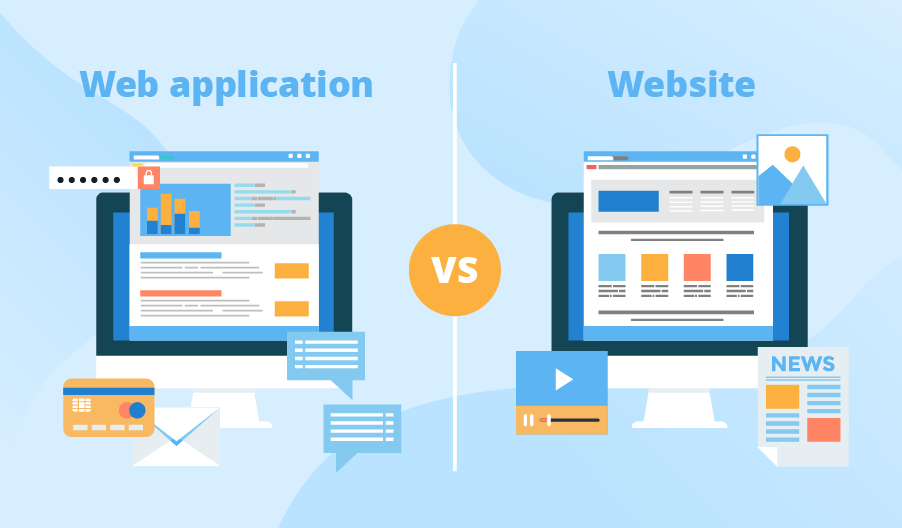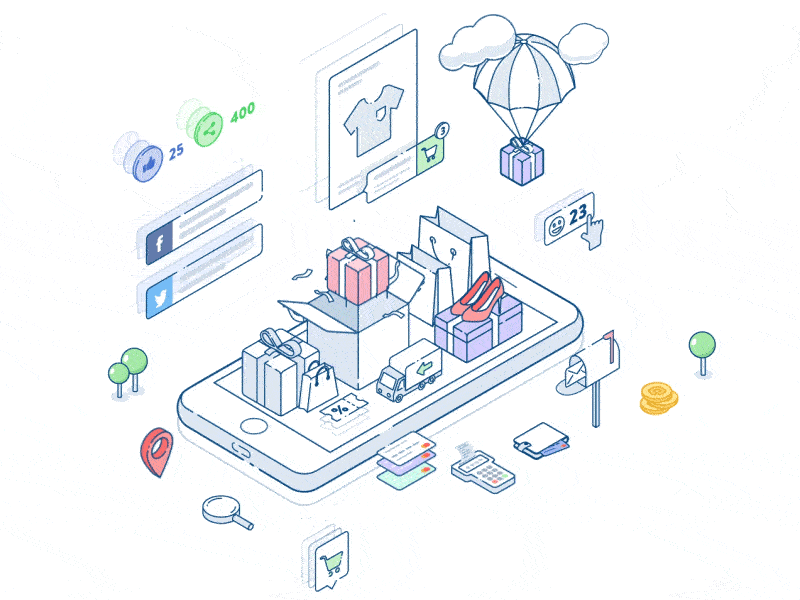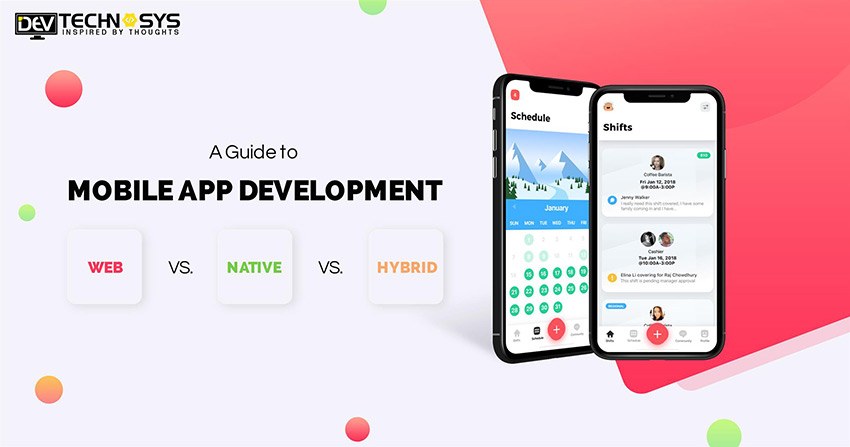Which mobile app development approach to choose from the web app development, native app development, or hybrid app development? This query is highly debatable as each of these variants comes with its own advantages and disadvantages.
At the same time, all these development frameworks and technologies are progressing. For instance, with the introduction of the React Native framework and Progressive Web Applications, the web development cards are all shuffled.
This is a tough call to make for the various mobile app development companies which is why they hire mobile app developers proficient in the job. It also helps them understand the right mobile app development framework for their project and assists in the decision-making process.
In this guide, you will learn about the 3 frameworks in-depth along with the aspects of mobile app development. After going through this article, you will be able to choose whether web app development is the right option for your business or whether native or hybrid applications are the best fit for your startup, business, or project idea.
Table of Contents
What is Web Application Development?
Websites are not required to be installed on a mobile device, in fact, they can be hosted on web browsers. Basically, websites have a resemblance to native mobile applications.
Users can easily interact with the web applications with the help of a WebView. Unlike the typical websites that remain open for information consumption, web applications are generally categorized for functional purposes.
Web applications also require a browser to work with, and it can be said that the websites also come with many native functionalities. Users, in general, do not install every application on their device but they prefer to use a WebView for interacting with the application.
How Is Any Web Application Different From The Typical Websites?
A website has the potential to offer more data and information to the users as compared to the web application. It means the web applications can condense the content of the website to enhance the overall functionality of the application.
Web applications can also load on the browsers like Safari, Chrome, Firefox, etc., and it is not required to be downloaded from the application stores. Web applications do not consume the space on users’ devices.
If the goal of any Android or iPhone app development company is to provide user and mobile-friendly content to their users, developing a web application can be a suitable choice for them.

Web applications also represent a cost-effective manner to put your platform in the hands of trustable users. It is because users get easily frustrated with poor performance applications and other issues like small images, high app load times, and low network availability.
Typically, web applications can be developed using CSS, JavaScript, or HTML platforms, and they can run inside web browsers. There is no special software development kit available for the developers to use with website app development.
However, there are multiple templates available for the developers to work with. If you are willing to develop a web application for your platform, make sure the process remains straightforward and is fast to build.
Advantages Of Web Applications
- As compared to native applications, web applications have less expensive upfront.
- Web applications do not stick to the standard operating system rules and protocols. It means, web applications do not require approval from other marketplaces and they can be easily released at any time in any format.
- The web application can be developed for multiple platforms as long as it can run on the appropriate web browser.
- As compared to other full-stack development services platforms, web applications are comparatively easy to update and maintain as they have a common base code across multiple platforms.
- The updates in web applications do not require to go through the application store, which means that users do not have to manually update the application updates.
Disadvantages Of Web Applications
- Web applications have a comparatively smaller scope in terms of hardware and other features.
- Web applications are slow and less responsive as compared to native applications.
- Web applications are less creative and interactive as compared to native applications.
- There are limited branding opportunities available with PWA
An Introduction To Native App Development
Let us first start with the meaning of native app development. Native applications are specially crafted to comply with the guidelines and requirements of a specific operating system.
In the native app development process, the applications are developed individually for each of the operating systems. Native vs. hybrid application development is advantageous as it gives unity with the devices and their features.
This application can be downloaded directly from the application stores to mobile devices. They can be launched with any external assistance from the browsers and tools, they also store the data in the gadget’s memory and cloud service.
Native applications are developed with the assistance of native programming languages. They also compile native codes to run on certain processors and a well-versed set of commands. The mobile app development company essentially uses:
- Software development kit (SDK), a predetermined set of development tools
- Integrated development background (IDE)
For Android app development, Android SDK and Android Development Kit are used. These tools provide the essential tools, libraries, and headers for developing native app features, managing user inputs, device hardware, and other sensors.

Java is a most renowned programming language, more than 9 million native app developers all across the world use Java to develop their code. The main advantages of Java in native app development are as follows:
- Object-oriented programming language
- Robust security feature
- User and design-friendly
At the same time, Kotlin is also gaining popularity in terms of native mobile and web application development. Java supports native application development for Android app development, as well as Kotlin language, which has been doing it in recent years.
Advantages Of Native App Development
- Native application development user interface allows developers to understand the app navigation quick
- It ensures a great user experience and design possibilities. For example, the cross-platform app development uses the implementation of sophisticated user experience and user interface animation.
- Fast operating speed, flawless app performance, and smooth app design. Native vs. hybrid app is used for specific app development and takes full advantage of the processing speed of the app and device.
- Excellent integration with the device hardware.
- Capable of operating offline. Internet connectivity is needed if there is any specific function required for native app development.
Native applications look and feel great, and they operate really well. This leads to enhanced customer satisfaction, retention rates, and user experience. On the contrary, there are various factors you need to consider before making a decision regarding the native app development.
Disadvantages Of Native App Development
- It requires a proficient quality app, development team.
- The application and maintenance costs extend proportionally to the OS devices.
- It requires constant app updates to align well with the current OS versions.
- Both the Google and Apple play store receive around 30% commission from the in-app payments.
Why Choose Native App Development?
Native application development is currently a popular option chosen by the well-known mobile application development company. Some of the native app names are – LinkedIn, Telegram, PokemonGo, Google Maps, etc. To summarize the credibility of native app development, it is advisable to choose it for the below-mentioned reasons:
- If the application requires high performance
- To keep up with the existing market competition in case of similar market crashes
- When the native or progressive web app development niche remains unoccupied, to starts with a special first product version (MVP)
- If you plan to update and scale the application on a regular basis
An Introduction To Hybrid App Development
The term hybrid, in general, refers to a mix of 2 or 3 components, elements, or characters. Hybrid applications come under the category of cross-platform app development.
Its major advantage is that it allows quick app launch without major expenses. The main variants of hybrid applications are Progressive Web Applications, mobile web apps, responsive mobile websites, etc.
In contrast to native app development that has no subcategories, there are various kinds of hybrid applications. Native vs. hybrid application development is utilized for specific operating systems or platforms with the help of a specific programming language.
However, hybrid app development companies hire dedicated developers to develop applications that can easily work across multiple platforms.
For example, the hybrid applications that are developed for Apple iPhone can also operate on Android devices and platforms. In simple words, hybrid applications refer to a combination of web applications and native applications. It can be categorized as a website at the center and has a native application on its external link.

The basic difference between a native and hybrid application is that hybrid applications are built with the help of HTML, JavaScript, and CSS. This provides a thin native shell along with WebView for accessing native application system functions in the application.
It is to no surprise that the majority of the top mobile app development companies go for hybrid application development as compared to native. Some of these examples are Amazon, Netflix, EverNote, etc.
Advantages Of Hybrid App Development
Hybrid applications can be developed with the help of a wide range of cross-platform app development tools and kits that require a considerable amount of application coding time.
Some of the most popular tools for hybrid app development are PhoneGap, React Native and Native Script. The hybrid applications can be developed with the help of the stores and can be launched in the native application stores. The main advantages of hybrid app development are as follows:
- It is cost-efficient as it is loaded with a number of readymade components and models.
- It follows the rule ‘compile once, run everywhere’, and it has a great reach for Windows, iOS, and android app development company solutions as well as
- Hybrid app development has support from a huge development community.
- It is highly adaptive and flexible in terms of user experience/user interface design.
- It is extremely easy to work with, and the updates and maintenance in the hybrid applications can also be done without hassle.
Disadvantages Of Hybrid App Development
- Potential application integration issues, for example, notification preferences, advanced storage options, and other local settings.
- It requires customizing the applications to various existing browsers.
- It is incapable of implementing advanced or complex application features.
- It causes various performance issues, for example, list scrolling, delays, swipes, etc.
A Quick Overview: Web App Vs. Native App Vs. Hybrid App
A web application refers to a software program that makes use of web technologies such as JavaScript, CSS, and HTML. Web applications also run on the web browser, and they are capable of performing app development tasks through the internet.
Web application vs. native application is a different cross-functional application that can operate on multiple devices. It is worth mentioning that Facebook was earlier a web application that was redeveloped from scratch backed by React Native.
Native applications and Hybrid mobile applications are also accessible in the mobile app development marketplace. Web applications are accessible through mobile browsers as websites. And there is no requirement to download the web application, the users can simply create a bookmark on their home screen.
Conclusion
Before initiating your mobile app development process, it is important to prioritize the experienced mobile app developers for hire. Also, you have to choose straightforward and simple mobile app development projects.
Let us go back to our first question: Which mobile app development approach to choose from the web app development, native app development, or hybrid app development? The mobile web app development as compared to native and hybrid is a cost-effective option but it provides minimum features.
On the contrary, native applications being the most expensive offer great quality and performance. The best recommendation is to try to choose the most affordable and suitable option for your platform.
























